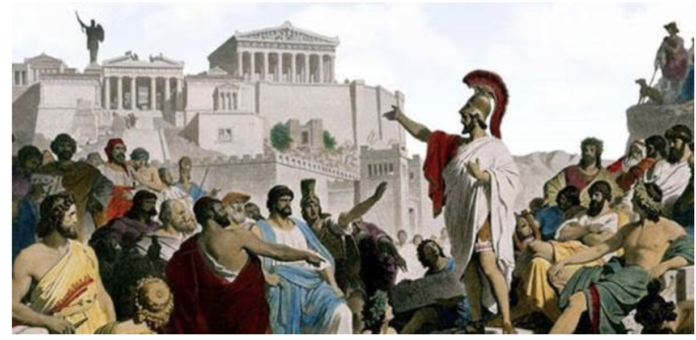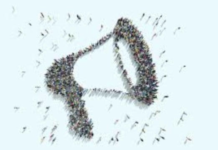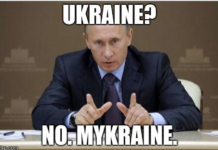IN THE END, the question comes down to this: can human-beings be trusted to do the right thing? If you think that they can, then you will be a democrat and, probably, a socialist. If people can be trusted, what possible reason could you possibly have for not trusting them? All of them. All of the time. With everything.
The problem with trusting all of the people, all of the time: that is to say, with democratic socialism; is that most of us don’t trust them. Not all of the people. Not all of the time. Most of us work on the principle that there are some people who cannot, who should not, be trusted.
Some people are simply too stupid to be trusted. Others are too venal – too greedy. Still more are dishonest and manipulative. And, finally, a certain irreducible percentage of any given population are just too damn evil to be trusted – with anything.
But, once you admit that only some of the people can, or should, be trusted, then your journey away from democracy and socialism has already begun. The moment our common humanity ceases to be sufficient reason for determining society’s course, then it becomes necessary to establish some other criterion for participating in the decision-making process.
Immediately, this presents us with a new problem. Who gets to set the criteria for participation? Should it be the wisest? The richest? The strongest? The most cunning? It’s a question that has perplexed the thinkers of every age, from Plato to Peter Thiel.
History’s answer is unequivocal: decision-making in practically every society there has ever been settles eventually upon the shoulders of the richest and the strongest. (Although the most cunning usually contrive to also have a say in the running of things!)
What about Ancient Athens? The world’s first democracy? Well, for a start, Ancient Athens was a far cry from a system of government that trusted all the people, all the time. If you were a woman, or a slave, your participation in decision-making was expressly forbidden. The same applied to “foreigners”, no matter how long they had lived in the city. Only free Athenian males could vote or hold office.
What’s more, Athenian democracy was mostly a reaction to bad government, not an experiment in good government. The free men of the army and navy that preserved the independence of the city-state, reacting against the misrule of tyrants (strong men) and oligarchs (rich men) came up with the last ditch idea of entrusting the government of the city to themselves.
What the freemen of Athens never overcame, however, were the political effects of the unequal distribution of talent and guile. Some men were good talkers. Others were superb schemers. Democracies throughout history have proved to be extremely vulnerable to such individuals.
The other great paradox of democracy is that it tends to be undermined by its own success. Athens became extremely wealthy and could not resist the temptation to use its riches to overpower its weaker and poorer neighbours.
Unfortunately, the building of empires renders democracy increasingly fragile. Those made wealthy by imperialism – always a minority – all-too-often use their ill-gotten riches to corrupt the democratic process. The resulting progression toward oligarchy and plutocracy can only then be stopped by the intervention of a demagogue who, if successful, soon assumes the role of tyrant.
Rich men, or strong men. It is not an appealing choice.
But, surely, these ancient precedents do not apply to us? In the Twenty-First Century just about every member-state of the United Nations boasts universal suffrage. Democracy, of a sort, has become the norm. All of the people: regardless of their race, colour, sex or creed; get to decide. Maybe not all the time, but certainly every few years – at the ballot box. So, aren’t we all democrats now?
Democrats, maybe. But certainly not socialists. The most important thing to note about the governing arrangements of the last 200 years is the way in which political power has been separated from economic power. In a nutshell, more and more people have been given a say over less and less.
The truth of this observation becomes obvious the moment the ordinary citizen gives a moment’s thought to how much power they get to wield every day in the place they spend most of their waking hours – the workplace. The contemporary capitalist enterprise (think Amazon) is not in the least bit democratic. Subtract the hours spent travelling to and from the workplace, and the hours spent sleeping, and most of the lives of most human-beings are lived out in a world where tyranny is the norm.
Nothing is more fiercely resisted in the capitalist enterprise than workers attempting to democratise the employment relationship. (Once again, think Amazon.) The greatest political struggles of the past 200 years have been sparked by the attempts of working men and women to wrest some measure of control over their economic circumstances from the capitalists whose enterprises have come to dominate more and more of their lives.
Social-democracy cannot be countenanced by capitalism, precisely because it seeks to merge politics and economics into a single argument and a single movement. In order to fight social-democracy effectively, capitalist intellectuals have arrived at the startling conclusion that no human-beings can ever be trusted to do the right thing. That people are, indeed, too stupid, too venal, too greedy, too dishonest, too manipulative, and, ultimately, too damned evil, to be entrusted with decision-making power over anything.
The truly innovative aspect of this radically anti-democratic and anti-socialist doctrine is that the capitalists have included themselves among the human-beings who can’t be trusted. They do this because they are convinced that a mechanism exists which can be relied upon to produce optimal outcomes in every conceivable set of circumstances.
Into this mechanism are fed the billions of choices made by human-beings everyday over every aspect of their lives. From the cut and style of a suit, to the creaminess of an ice-cream, to the speed and efficiency of a motor vehicle: the market mechanism is wiser than any individual, more efficient than any government, and confers upon each participant in its processes the freedom that comes from relinquishing all responsibility for the lives of others. According to this doctrine, the dollar bills spent by ordinary citizens are a more effective determinant of the public good than any number of triennial ballot papers.
The only politics which these radical capitalists (whom some call Neoliberals) are prepared to tolerate, is the politics dedicated to protecting and extending the market mechanism. Theirs is a politics devoted to identifying the designs of the social-democrats, and devising the most effective means of defeating them. It is a politics dedicated to instilling in the ordinary person a level of faith in the market mechanism that is practically religious. A politics which paints every attempt to force the market to generate specified outcomes as the work of totalitarian socialists. Arrogant politicians and bureaucrats, whose necessarily limited information cannot produce anything other than economic catastrophe and the extinction of personal liberty.
Their so far winning wager has been that those who decline to trust their fellow human-beings to do the right thing will, in very short order, cease to trust themselves.






All that information & you forgot to mention Christianity? I am not talking about the corrupt baptized paganism that passes for Christianity today but the first century AD example.
the hippy drippy commie jesus that evangelicals love so much?
I will presume you are being facetious since we know the evangelical version of Jesus is capitalist & has a stuff the poor mentality.
While my first thought is that people would accept the promise “Come unto me, all ye that labour and are heavy laden, and I will give you rest.” they also need to know we can follow the “love your enemy” instruction because we serve an all-powerful God who will pass judgment “Dearly beloved, avenge not yourselves, but rather give place unto wrath: for it is written, Vengeance is mine; I will repay, saith the Lord.”
The logic behind it is if you are kind to your enemies & it wins them to Christ then you have gained a friend & will both inherit eternal life while if you repay with evil then you are subject to the judgment.
yup it’s constant surprise that those who have ‘found jesus’ actually mean the angry bearded old testament guy in the sky
You appear confused Chris.
The political philosophy that trusts people to run their run their own lives without government interference is called libertarianism. Socialism by contrast is centrist and authoritarian in nature.
Thank you, Andrew, for so fulsomely confirming my thesis – albeit unwittingly!
You’d have to expand on that reply to explain yourself Chris.
Unless, of course, you’ve had a late in life ‘Conversion on the road to Damascus’. In which case, welcome to the ACT Party!
Agree Andrew.
Agree, I was puzzled by that statement. One thing that the CV19 public policy response showed us is that the government *doesn’t* trust the public to do the right thing and we need a seemingly endless set of rules to follow
Ah no. The political philosophy that trusts people to run their own lives is called anarcho-socialism. Libertarianism is a right-wing corruption of this idea – where there are no limits on anybody, so your life (and mine) will end up being run by someone who has more money, more power, more guile and fewer principles. In its supposed hatred of state tyranny, libertarianism leaves the field open for private tyrranies – who then of course capture the state and bend it to their own designs anyway. This is actually the purpose of libertarianism – it’s an ideology dreamed up in bad faith to let the powerful do their worst – and call it freedom.
Chris’s piece understands these obvious facts very well – for some reason you choose not to.
No it’s not – I shall run the risk of being labelled a splitter in the finest tradition of Monty Python however libertarianism is predicated on the belief in the individual first and foremost with some rules being permitted depending on the level of purity demanded.
In its purist form though, it’s no different to communism insofar as it’ll never work for all the reasons Chris outlines. Some people are bad.
Tangential comment, it seems that there’s a broad agreement that some people are bad and evil here. Why is it then when incarceration is discussed that this blazingly obvious truth is denied?
Yes it is. Libertarianism in practice turns out to be highly authoritarian. That is actually its purpose – to replace state power with private power, to replace power with at least some claim to democratic legitimacy with power that has no such legitimacy.
libertarianisn means if they can afford it a libertarian can buy your daughter for whatever purpose they please…untrammelled by those pesky big government regulations.
Chris: “The only politics which these radical capitalists (whom some call Neoliberals) are prepared to tolerate, is the politics dedicated to protecting and extending the market mechanism.”
Only half correct, part of the liberal economics idea is that, for the economy to work properly, it must be protected not only from foolish government lead distortions (plenty of examples right here) but also from the rise of monopolies and cartels, barriers to entry and restrictive trade practices. Thus we have public commissions and the institution of policies and laws that (attempt to?) protect the people and the market itself from excess in that direction. Companies are broken up and amalgamations and takeovers refused quite often. Globalisation and the rise of multinational corporations complicate things but the intention is a good one IMHO.
The tragic history of failure of the central government controlled/directed/owned economy are well known, the counter, the power of free enterprise and trade to raise living standards, less so.
Anyone who has played monopoly must understand the problem with capitalism and by extension neo-liberalism. In a finite world where winning means owning everything, the outcome for everyone else must be losing. No Monopoly version is won by everyone doing well.
That’s life though isn’t it? Not all of us will or do amount to much.
That’s life under capitalism and ravening growth Yeti. You know what you know, but have you envisaged what you don’t know but perhaps comprehend intuitively and then check out for fact?
andrew you are aware ‘libertarian’ before the word was stolen by US rightards referred to a leftist position roughly equivalent to anarchism….another word stolen in the chimera anarcho-capitalist
Surely the debate is not so much over who participates in the exercise of choosing those who govern, but what those, who we do elect, are charged with implementing. Without a universally agreed understanding of what the people have determined constitutes their ideal society, its promise will never be achieved.
To have instituted a system that every three years affords one group the opportunity to implement policies diametrically opposes to that of its predecessor, and call it democracy, is ludicrous.
it’s worse than that they do nothing and call entropy policy
Chris, we are the same vintage. We saw Nixon bin the Gold Standard resulting in the inflationary expansion of fiat currency.
We saw the scrapping of welfare, full employment policies, privatisation.
We saw the end of Glass Steigl, the ditching of our Reserve Bank as the lender of the last resort resulting in financialisation, aka rentier neo feudalism.
We saw “free trade zones” designed to allow off shoring of industry and services to cheap labour countries.
We have seen ineffective anti competition laws distort markets into monopolies.
At every step the electorate failed to respond. Given a direct reversal of these policies we can reestablish our democracy. It is never too late, we need to fight.
It is never too late to fight–except–Climate Disaster shortens the time frame for fighting, particularly if you live in a burnt out dustbowl (hello Australia) or a tiny Pacific Island.
“But if we fight we might lose…” is an old refrain to which the answer is “yes, but if you do not fight you will definitely lose”.
If leveraged property owners soon feel the burn is there a point of unity, such as a campaign against the Aussie Banks and the NZ neo liberal Parliamentary parties, organising the other half that rent their overpriced dumps? Lets hope so!
Zapata, better to die on your feet…..
Democracy scares these bastards, its why they own the parties and people.
Or perhaps it is more that the ‘market mechanism’ Chris refers to actually works more often than it doesn’t whereas Socialism only really works in rarefied academic circles safely protected from the realities of life.
Also, I think the expression that ’you can’t fool all the people all the time’ is pertinent to the above essay. Democracy isn’t perfect by any stretch but it is the best of a bad bunch of options.
As for being powerless, look at the elections that saw the end of John Howard or Thatcher (both hard core Milton Friedman / Chicago School acolytes). If the inference I take from the essay above is correct, then the suggestion would be that the market mechanism’s enablers (Maggie and John in this instance) would have lived forever rather than the electorate overwhelmingly rejecting them as they did.
it was the poll tax that did for thatcher and civil disobedience on a grand scale and no not just the riots yeti.
maybe socialist markets (what ever the fuck that is) but capitalist markets are failing all around us as we speak
This teacher is expected to have values and be a good role model for minds in formation. But can’t be trusted.
https://www.rnz.co.nz/news/national/465277/christchurch-high-school-teacher-named-students-and-ridiculed-their-work-on-podcast
I don’t think that people can just be trusted to have values that are considered worthy and which support a ‘good’ society. The radical changes that some people are demanding to do with gender, the change on birth certificates, nude men pretending to be women, adults using young children for sexual gratification,people becoming rich by dominating a market for needed essentials. How do we get boundaries back, not narrow-minded intolerance or strictness, set standards that are reasonable for personal behaviour as a country and keep to them? Then we can have less reliance on laws and punitive responses to the breaking of them. We all need agreed guidelines or permission to be a reasonable exception.
If we understood / were taught the reasons for laws and social custom perhaps we might adhere more.
The difference between NZs main parties is about what comes first: the chicken (socialist benefits) or the egg (capitalist economic taxes to fund the benefits).
The difference is fundamental & a worthwhile debate. Ideally they’d bang their own heads together to resolve it instead of the electorate having to do this for them ever 2 or 3 terms.
if certain groups actually paid taxes the ‘chicken’ would need a smaller ‘egg’ from the rest.
Well, that about fucks the 120 MP’s we have in parliament then Chris!
What next?
Chris got it right with “trust “. But it’s rare and sometimes luck. It doesn’t matter what type of governing system you have if you have a fuckwit In charge it fails. If Putin wasn’t a lunatic Russia would truck along with most of his population happy enough. That won’t last. If Xi was happy with the Muslim population and was happy to let Taiwan truck along everyone would be happy. But he can’t. He’s a fuckwit. Everyone will suffer. Our own Jacinda seems to value the overseas opinion of her rather than her own people, going by her actions. It doesn’t matter what political flavour you prefer, if the leader is useless the result is inevitable. You can debate the type of Government until the cows come home. It’s the people that run it that counts. Unfortunately the poor and disenfranchised never get that chance unless there’s a revolution.
What seems to be left out so far in this discussion of effective democracy is the role of information. For democracy to have any chance of working for the majority everyone participating needs to have access to the truth about the significant current issues.
Most of the argument between participants is based on what they believe to be the truth about anything and everything. Our MSM seems to me to be almost entirely engaged in “controlling the narrative”, ie. directing people to think the way that outlet wants them to think which is very seldom the unadulterated truth.
Without being able to trust our MSM the alternative media varies in it’s integrity from total honesty with almost no following to wild fantasy and speculation.
The media has a huge responsibility to democracy and it is failing that responsibility dreadfully.
There are three main topics we need to all agree on at the moment.
Is the climate being catastrophically damaged by our CO2 emissions?
Is covid as deadly as the experimental vaccines ?
Who is to blame for the war in Ukraine and what should be done about it.?
The population is divided almost religiously on one or other side of these issues and there is an unending supply of competing “truths” about every aspect of all of them . We have to chose what seems most plausible as no source can be entirely trusted as every source has an adgenda behind it that wants you to believe something rather than to know something.
Most people unfortunately chose what is most socially comfortable to believe rather than to honestly reason out the most likely truth from the competing points of view.
If we all had trusted information the human weaknesses of selfishness and egotism would be overwhelmed by our better natural qualities IMHO.
Happy Easter folks
D J S
“There are three main topics we need to all agree on at the moment.
Is the climate being catastrophically damaged by our CO2 emissions?
Is covid as deadly as the experimental vaccines ?
Who is to blame for the war in Ukraine and what should be done about it.?”
And that’s the paragraph in which you removed all your clothes.
If you have just divined my position on these topics from the above then TDB’s censorship has been more comprehensive than I had imagined.
D J S
Trust comes from democracy.
That old thing demo-cracy.
No you all can’t be trusted you need experts to do the thinking and deciding for ya’ll.. And they’ll charge you heaps for it
next time you ill don’t see an ‘expert’ operate on yourself with a can opener and a staple gun.
Very insightful Chris. It is interesting that there is still a lack of trust between the people and the respective governments. Had there been more trust, though, Donald Trump may still be the President of the United States of America.